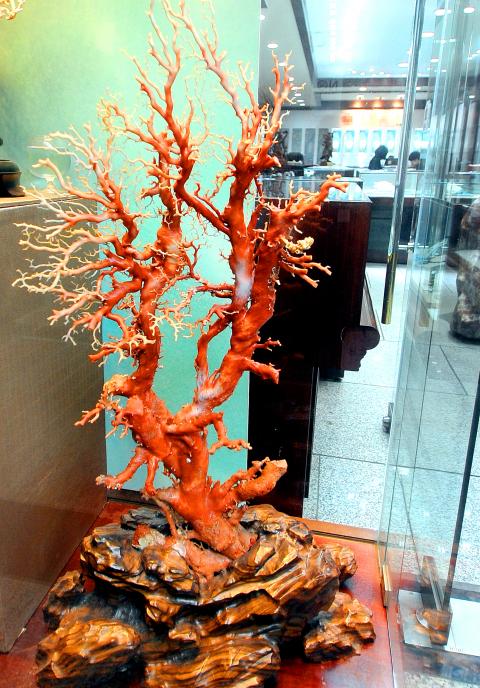The Fisheries Agency yesterday defended revisions to policies on coral harvesting, saying it has adopted stringent measures to ensure sustainable growth, despite a local media report alleging that the agency had eased restrictions.
A report in the Saturday edition of the Chinese-language Liberty Times (the Taipei Times’ sister newspaper) said the agency relaxed the regulations on licenses for coral harvesting boats so that the permits can be inherited, transferred or switched to a new ship in spite of the stance of the Convention on International Trade in Endangered Species of Wild Fauna and Flora (CITES) against trade in corals.
CITES meetings have repeatedly discussed restricting trade in red coral, which the Liberty Times said is a favorite souvenir among Chinese tourists visiting Taiwan.

Photo: Fang Pin-chao, Taipei Times
The newspaper quoted Yen Ning (顏寧), an ocean campaigner from Greenpeace East Asia, as saying that the Taiwanese coral market is being swamped with Chinese buyers since China has banned the collection and illegal sales of red coral, allowing only transactions with certificates of origin.
“Allowing coral fishing boats permits to be transferred or inherited is outrageous and comparable to selling our ancestral treasures to China,” the organization said.
According to Allen Chen (陳昭倫), an associate research fellow at Academia Sinica’s Biodiversity Research Center, the rate of growth of red coral was even slower than Hermatypic coral closer to shore.
With a growth rate of 0.24 to 1.32mm per year, further destruction of red coral would be disastrous for Taiwan’s sustainability of fishing as red coral is an important habitat for fish, shrimps and shellfish, the Liberty Times report quoted Chen as saying.
The Fisheries Agency said that its revisions were made in consideration of coral harvesting boats, most of which are part of a family business in which skippers and owners are related by blood or marriage.
The new regulations allow inheritance and transfers between those relatives, it said.
Owners or inheritors can build new ships only if their old ones are damaged or sunk due to unavoidable events, though the capacity of the new ships must be reduced by 10 percent.
While the agency acknowledged harvesting areas were increased, it said that the total haul allowed per year has been cut by half, from 12 tonnes to 6 tonnes.
Taiwan’s coral harvesting focuses on deep sea precious gem corals, particularly the momo, aka, shiro and miss varieties, instead of shallow sea reef-building corals, the agency said.
While shallow-sea coral regenerates, it does so very slowly.
The agency said that it adopted an early-warning system in 2009 that restricts harvesting to five areas deeper than 100m to avoid affecting shallow coral ecology.
Additional reporting by Chung Li-hua, Yang Yi-min and Yang Ya-min

CARROT AND STICK: While unrelenting in its military threats, China attracted nearly 40,000 Taiwanese to over 400 business events last year Nearly 40,000 Taiwanese last year joined industry events in China, such as conferences and trade fairs, supported by the Chinese government, a study showed yesterday, as Beijing ramps up a charm offensive toward Taipei alongside military pressure. China has long taken a carrot-and-stick approach to Taiwan, threatening it with the prospect of military action while reaching out to those it believes are amenable to Beijing’s point of view. Taiwanese security officials are wary of what they see as Beijing’s influence campaigns to sway public opinion after Taipei and Beijing gradually resumed travel links halted by the COVID-19 pandemic, but the scale of

TRADE: A mandatory declaration of origin for manufactured goods bound for the US is to take effect on May 7 to block China from exploiting Taiwan’s trade channels All products manufactured in Taiwan and exported to the US must include a signed declaration of origin starting on May 7, the Bureau of Foreign Trade announced yesterday. US President Donald Trump on April 2 imposed a 32 percent tariff on imports from Taiwan, but one week later announced a 90-day pause on its implementation. However, a universal 10 percent tariff was immediately applied to most imports from around the world. On April 12, the Trump administration further exempted computers, smartphones and semiconductors from the new tariffs. In response, President William Lai’s (賴清德) administration has introduced a series of countermeasures to support affected

Pope Francis is be laid to rest on Saturday after lying in state for three days in St Peter’s Basilica, where the faithful are expected to flock to pay their respects to history’s first Latin American pontiff. The cardinals met yesterday in the Vatican’s synod hall to chart the next steps before a conclave begins to choose Francis’ successor, as condolences poured in from around the world. According to current norms, the conclave must begin between May 5 and 10. The cardinals set the funeral for Saturday at 10am in St Peter’s Square, to be celebrated by the dean of the College

CROSS-STRAIT: The vast majority of Taiwanese support maintaining the ‘status quo,’ while concern is rising about Beijing’s influence operations More than eight out of 10 Taiwanese reject Beijing’s “one country, two systems” framework for cross-strait relations, according to a survey released by the Mainland Affairs Council (MAC) on Thursday. The MAC’s latest quarterly survey found that 84.4 percent of respondents opposed Beijing’s “one country, two systems” formula for handling cross-strait relations — a figure consistent with past polling. Over the past three years, opposition to the framework has remained high, ranging from a low of 83.6 percent in April 2023 to a peak of 89.6 percent in April last year. In the most recent poll, 82.5 percent also rejected China’s